Tag Archives: Reading
OHD_BLG_0109 Reading Group 22/09/2020
The topic of this reading group was trauma and oral history. The two pieces read were: “Oral History and Trauma: Experiences of sexualised violence under National Socialist persecution” by Helga Amesberger (Austrain) and “Oral history – ‘More dangerous than therapy’ ?: Interviewers’ reflections on recording traumatic or taboo issues” by Wendy Rickhard (who did Creature Comforts).
Event .v. People
A big issue in interviewing people about traumatising events is that you have this tension between the interviewee’s whole life and that key event. Both parties involved come together because of this event but the life of the interviewee is bigger than the single event. Their opinion of the event might have changed over the years and might still change even after the interviews, making the interviews also a single event in that person’s life.
There is also the issue between the traumatising event and the trauma that the person lives with because of the event. On top of that the trauma that these people live with might change and be manipulated by other things in their life and wider society. In the examples in the texts the traumatic events are layered between the taboo of sexual harassment. Which brings me on to the second point.
TABOO!
Taboo topics can become a bit of an obstacle for oral historians, as was discussed during the reading group. When talking about uncomfortable topics you could walking into the situation where you could reenforce the taboo further. By interviewing a person about a taboo subject you are also highlighting it, which is often considered positive however it has the possibility of backfiring. In addition when the interviews are done and the contents is released into the world no longer have control over how people react to the taboo subject.
The Transcribing Problem
This was a fascinating thing that came up in the discussion. It seemed that nearly everyone had experience of having the heaviness of the conversations hit them when they were transcribing the interviews. In fact Graham even said that he gives his transcribers a heads up that they do not have to finish it if they are not comfortable with it. Clearly the re-listening of the interviews opens up this space of realisation of the heaviness of the topic. I just found this to be a very interesting problem everyone was experiencing.
Access
Now this is the part most relevant to my work: what do we do with the tapes? The tapes can offer a whole bunch of problems. Lets say the tapes are available in an archive which can be accessed by anyone and some random person listens to them, what could happen? Well the recording could be taken completely out of context (like an old tweet) and manipulated into something else. The people were experts in their topic and knew exactly what they were talking about but if anyone can access it the recording they might not actually understand what is being said. Having the recordings open to complete interpretation could have extremely damaging consequences.
This only becomes a bigger problem when you make access to these tapes easier like what I want to do. This mostly happens through the use of technology which currently does not have a good reputation in protecting the users.
To end this access issue the group pondered on whether the tapes should be archived at all, only leaving behind the research done by the expert. This protects those who took part in the interview but also leaves a slight emptiness. (but that might mean because then my whole PhD would be pointless.) Maybe the question is not how should we archive but what we should archive.
And finally…
My favourite quote had to be from Rickhard’s text:
“You need to have money to be ethical”
That truly sums up everything. Because if there is anything that I have worked out about oral history is that it is in a constant battle between capturing an ongoing saga and permanent nature of capturing itself.
OHD_BLG_0111 #BLM
There is a lot say about this topic but mostly there is a lot to ask. For some #BLM is a time to fight and for others, it is time to reflect and review.
This reflection can been seen in the removing of statues and renaming of streets or in the case of my dad the renaming of inappropriate climbing routes. If I look at this from the point of view of someone who is interested in archives and the preservation of history, I feel this moment in history proves how history is not static. And it shows that how we tell history needs to be constantly updated. This includes archives. I remembering hearing somewhere that people struggle to find black history in archives after the mid 20th century because the words used to catatorgise the documents are not words we use today.
What I am hopefully am going to explore during this PhD is to how do we set up archives that allow this reviewing of history to happen easily and inclusively. Rather than making history a battle ground of identity it becomes the educational resource that it should be.
On the 16th June I joined the oral history reading group. We had been given two papers to read that were written in the 1980s and only one was written by a black person.
The first paper was by Kim Lacy Rogers called ‘Memory, Struggle, and Power: On Interviewing Political Activists” published 1987. In the paper Rogers reviews her work on interviewing activists, both black and white, who were involved in civil rights in New Orleans in the 1960s.
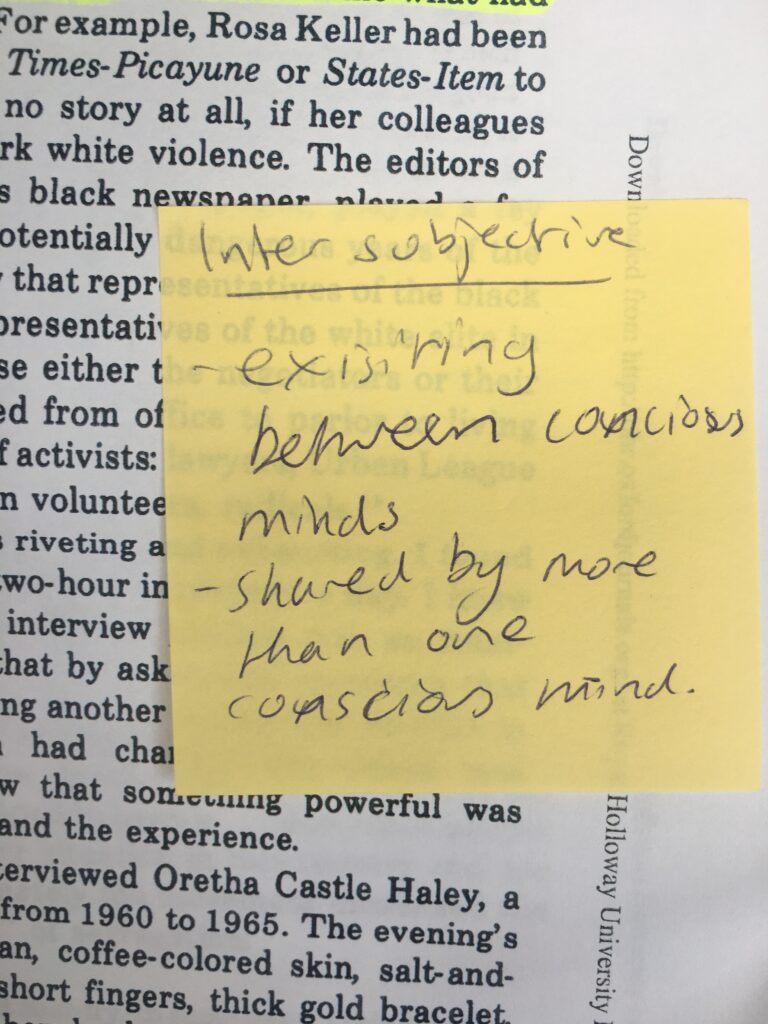
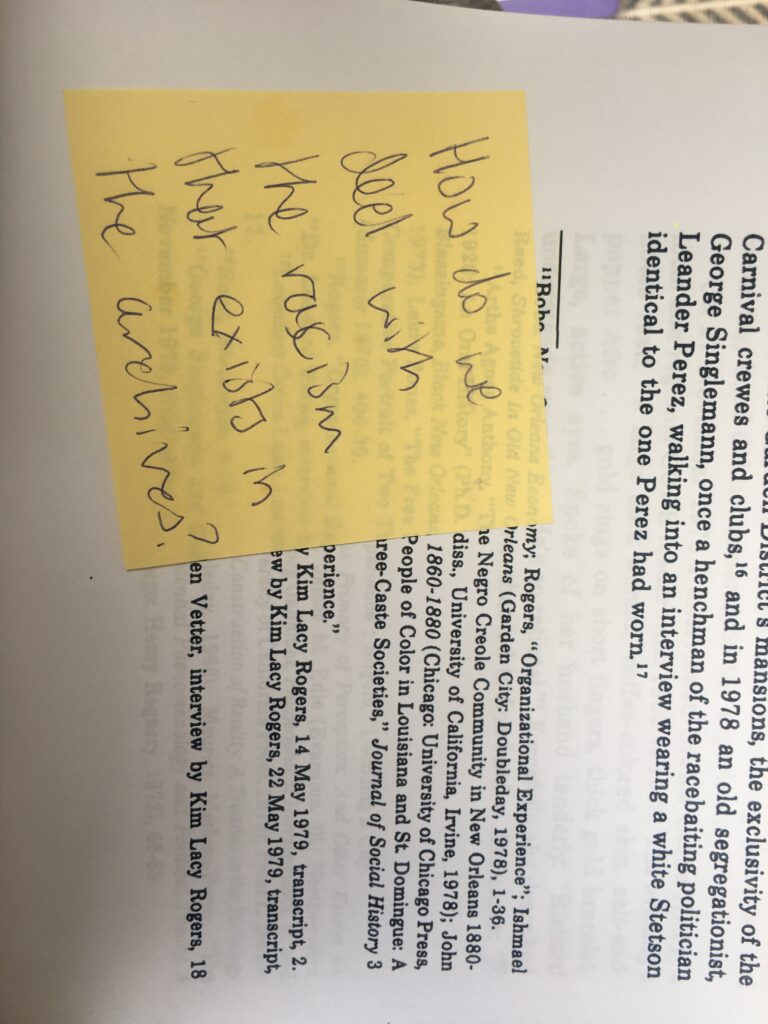
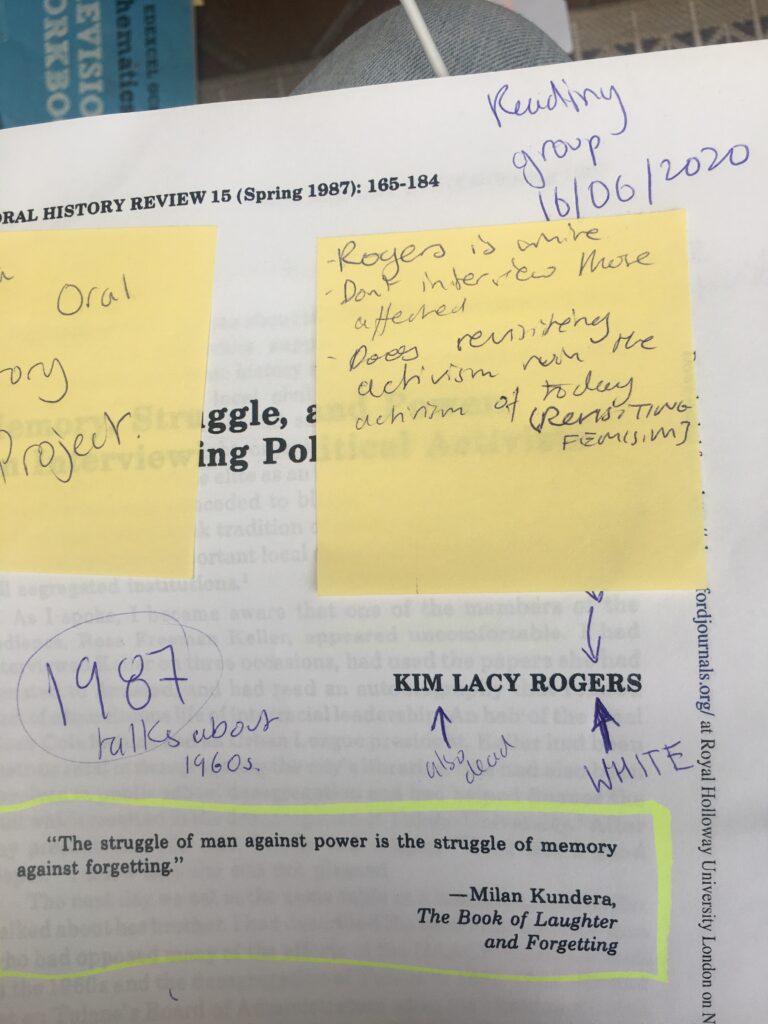
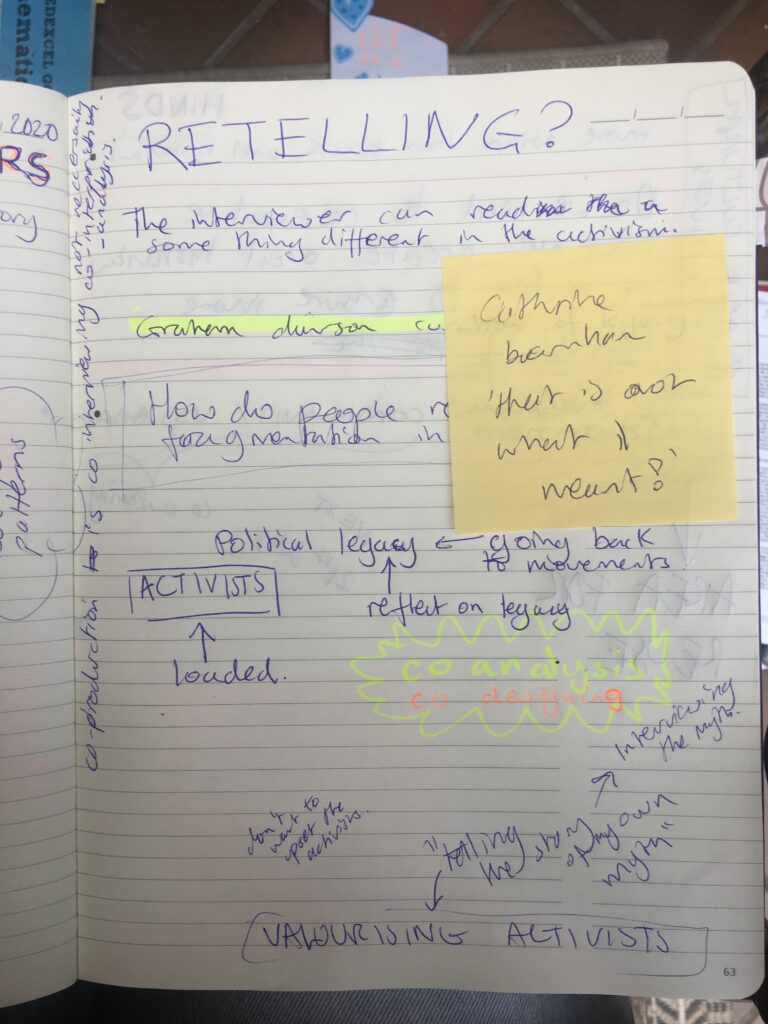
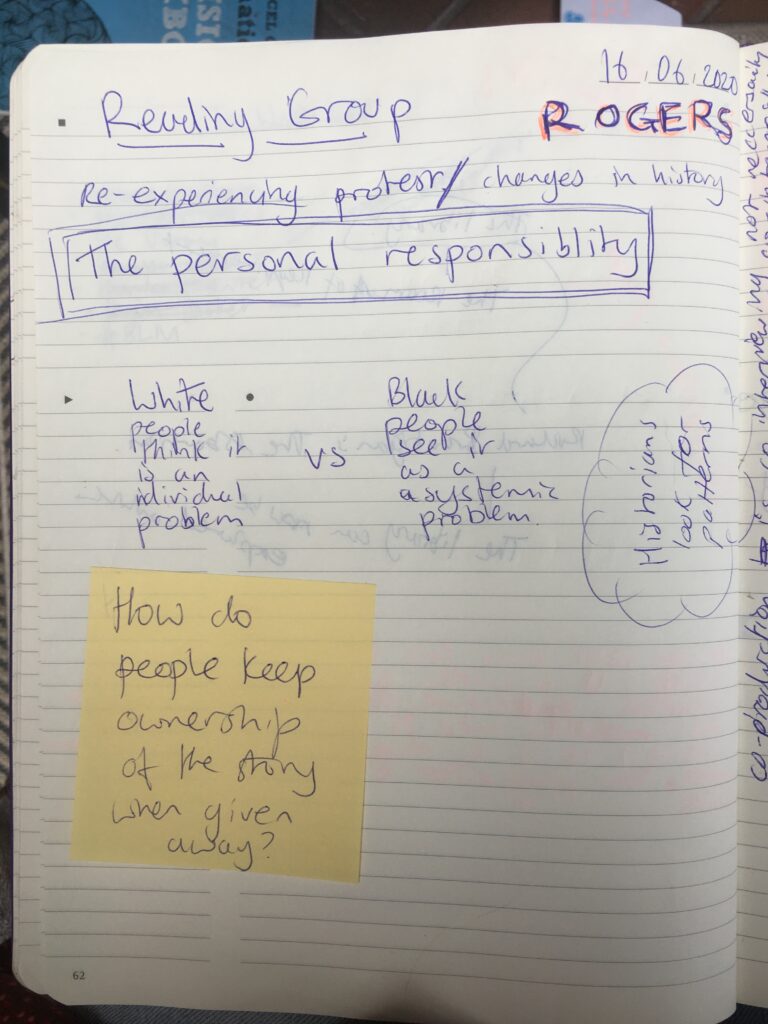
The second paper was by Donald Hinds called “The ‘Island’ of Brixton”. It was a portrait of Brixton in the 1960s.
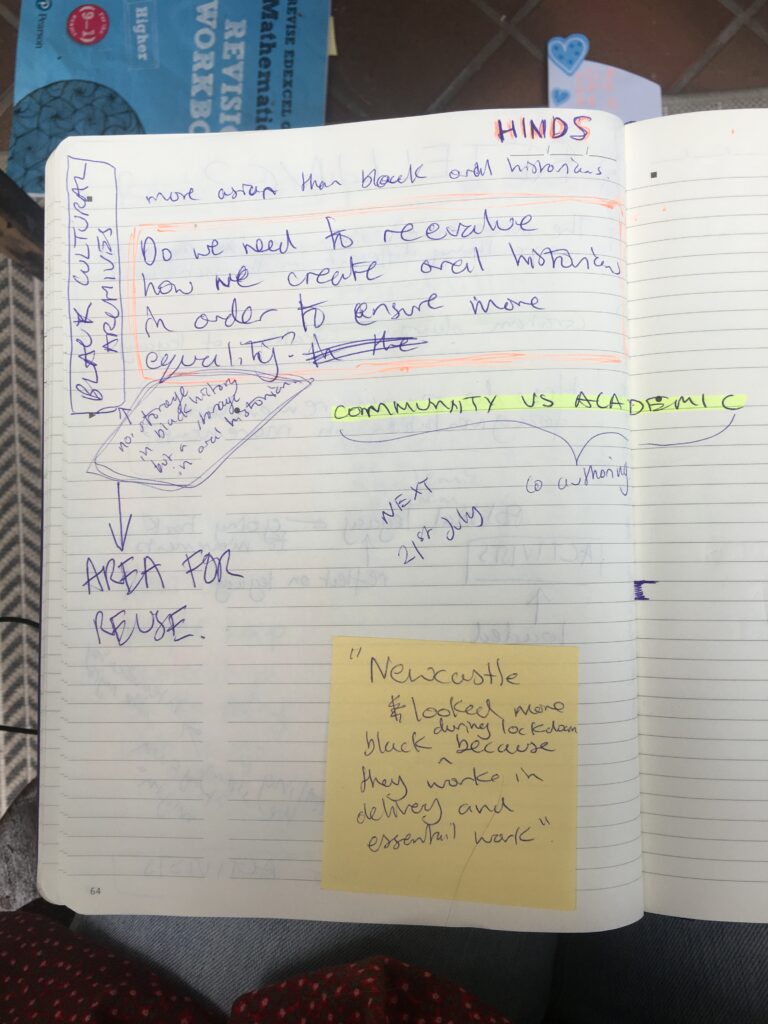
The discussion was mainly about how you interview activists when they are people who are aware of their position in history. What seemed odd to me was that people were not interviewing the people who were affected by the activism. If we are looking a text about activism in the 1960s written in the 1980s, yet the world it talks about could easily be the current one, then why aren’t we asking why things haven’t changed? What is their legacy? Do we need more revisiting of movements and more reviewing?
The other main topic was co-analysis, co-creation and other co-activities that should occur in order to create a more equal representation of the situation when it comes to race. The biggest issue being that there are not many people of colour in oral history yet there are plenty oral history recordings on the topics. Which as always are stuck in the archives.
I found it tragic that we were a group of white people who could only dig up two papers on the black oral history from the 1980s. This situation proves that a review of how we take oral histories and how we set up the archives is desperately needed.